Earth 2100: Scenarios of Complex Futures Speakers
From Santa Fe Institute Events Wiki
SFI ACtioN Applied Topical Meeting
May 22, 2019
Boston, MA
Please check back as more speaker bios will be posted periodically.
Speakers Include:
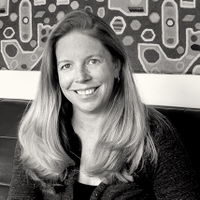
Santa Fe Institute
Jennifer Dunne is the Vice President for Science at the Santa Fe Institute, where she has been on the faculty since 2007. Jennifer received an A.B. from Harvard where she studied philosophy, an M.A. in Ecology and Systematic Biology from San Francisco State University, a Ph.D. in Energy and Resources from UC Berkeley, and an NSF Postdoctoral Fellowship in Biological Informatics. As Vice President for Science, Jennifer manages all science-related activities at SFI, including the resident and external faculty, postdoctoral programs, seminar series, scientific visitors, working groups and workshops, and sponsored research. Professor Dunne was named a Fellow of the Ecological Society of America in 2017. Her publications have appeared in journals such as Proceedings of the National Academy of Sciences USA, Trends in Ecology and Evolution, PLoS Biology, Philosophical Transactions of the Royal Society B, Proceedings of the Royal Society B, Ecology Letters, Ecology, and Ecological Monographs. Her work has been covered in media outlets including Scientific American, Wired, SmartPlanet, ScienceNow, and Nature News. She has served as an editor at the Journal of Complex Networks, Ecology Letters, and Oikos, is a series editor for the Oxford Series in Ecology and Evolution, and is on the advisory board of the science and culture magazine Nautilus.
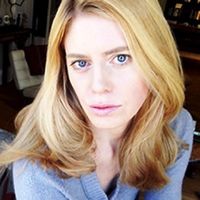
Santa Fe Institute
Jessica Flack is a professor at SFI where she also runs the Collective Computation Group with David Krakauer. They work on fundamental problems in evolutionary theory concerning collective behavior, collective computation, and collective intelligence—at all levels of biological organization—from societies of cells to societies of individuals to machine-human hybrid societies. They use insights and tools from biology, evolutionary theory, evo-devo, statistical physics, cognitive science and neuroscience, complexity science, animal behavior, information theory, theoretical computer science, and dynamical systems.
Her particular interests are in the role of collective computation/intelligence in the origin of space and time scales and in the emergence of robust structure and function in nature and society. She is fascinated with the idea that components in adaptive systems construct their macroscopic worlds through collective coarse-graining in evolutionary and/or learning time.
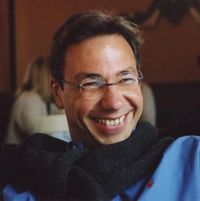
Harvard Medical School
Walter Fontana is a Professor of Systems Biology at Harvard Medical School and a member of SFI's Science Steering Committee. Trained as a chemist, mentored in theoretical molecular biology by Peter Schuster (Vienna), educated in evolutionary biology by Leo Buss (Yale), self-taught in computer science and charmed by the social sciences through John Padgett (Chicago), Walter has straddled many divides and taken risks in pursuing a professional trajectory shaped by the desire for a broadly engaging cross-disciplinary environment more than by career safety. He moved from the Santa Fe Institute to Harvard Medical School in September 2004. In seeing the opportunities that quantitative thinking and technology bring to experimental biology, the Fontana Lab pursued a theoretical and an experimental agenda that were deliberately distinct from each other. Having achieved a significant experimental milestone, the lab returned to all-computational and theoretical research in 2017.
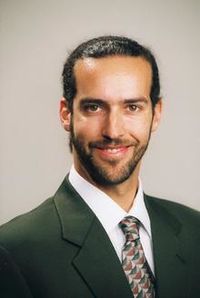
Brookings Institute & Santa Fe Institute
Ross Hammond is a senior fellow in Economic Studies at the Brookings Institution, where he is director of the Center on Social Dynamics and Policy, and an External Faculty member of SFI. His primary area of expertise is modeling complex dynamics in economic, social and public health systems using mathematical and computational methods from complexity systems science. His current research topics include obesity etiology and prevention, food systems, tobacco control, behavioral epidemiology, crime, corruption, segregation, trust, and decision-making.
Hammond received his B.A. from Williams College and his Ph.D. from the University of Michigan. He has authored numerous scientific articles in journals such as Lancet, JAMA Pediatrics, PNAS, American Journal of Public Health, Evolution, and Journal of Conflict Resolution, and his work has been featured in New Scientist, Salon, The Atlantic Monthly, Scientific American, and major news media. Hammond is an HHS-appointed member of the National Institute on Minority Health and Health Disparities advisory council, and serves as a public health advisor for the National Cancer Institute, an Advisory Special Government Employee for the FDA Center for Tobacco Products, and a commissioner for the Lancet Commission on Obesity. He also holds academic appointments at Harvard School of Public Health, the Santa Fe Institute, and the Brown School at Washington University in St Louis.
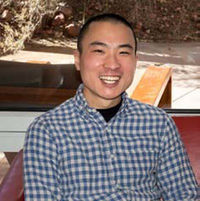
Santa Fe Institute
Albert Kao is a Baird Scholar and Omidyar Postdoctoral Fellow at the Santa Fe Institute. Prior to SFI, he spent three years at Harvard University as a James S. McDonnell postdoc fellow. He received his Ph.D. in 2015 from the Department of Ecology and Evolutionary Biology at Princeton University, under the supervision of Prof. Iain Couzin (now at the Max Planck Institute for Ornithology). He received his A.B. in Physics with an emphasis in Biophysics from Harvard College in 2007.
Using a range of experimental and theoretical tools, he studies the mechanisms and adaptiveness of collective behavior across biological systems, including slime molds, fish schools, ant colonies and human groups.
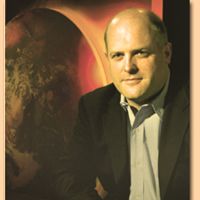
Harvard University and Santa Fe Institute
Daniel Schrag is the Sturgis Hooper Professor of Geology at Harvard University, Professor of Environmental Science and Engineering, Director of the Harvard University Center for the Environment, SFI Science Board Co-chair, and member of SFI's Science Steering Committee.
Schrag studies climate and climate change over the broadest range of Earth history. He is particularly interested in how information on climate change from the geologic past can lead to better understanding of anthropogenic climate change in the future. In addition to his work on geochemistry and climatology, Schrag studies energy technology and policy, including carbon capture and storage and low-carbon synthetic fuels.
Among various honors, Schrag is the recipient of the James B. Macelwane Medal from the American Geophysical Union and a MacArthur Fellowship. Schrag earned a B.S. in geology and geophysics and political science from Yale University and his Ph.D. in geology from the University of California at Berkeley. He came to Harvard in 1997 after teaching at Princeton, and he served on President Obama's Council of Advisors on Science and Technology.

Santa Fe Institute
Ashley Teufel is a Complexity Postdoctoral Fellow and Omidyar Fellow at the Santa Fe Institute. The goal of Ashley's research is to uncover how the physio-chemical laws that govern all biochemical reactions led to the emergence and expansion of complex life. Using a combination of computational and theoretical approaches Ashley's research is focused on the functional diversification of biological systems across multiple layers of organization. Thus far her research has centered on the evolution of proteins, duplicated genes, and metabolic pathways. In her future work, she plans to continue to study these molecular systems while also extending her work to examine how changing environments and ecological interactions further shape functional diversification.
Prior to joining SFI, Ashley was a postdoctoral researcher at The University of Texas at Austin in the Department of Integrative Biology. She holds a Ph.D. in Molecular Biology from The University of Wyoming, and B.S. degrees in Computer Science and Mathematics from New Mexico State University.
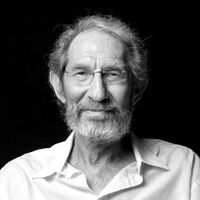
Santa Fe Institute
Geoffrey West is Distinguished Professor and former President of the Santa Fe Institute and Associate Senior Fellow of Oxford University’s Green-Templeton College. His BA is from Cambridge and his PhD from Stanford, where he later returned to join the faculty. West is a theoretical physicist whose primary interests have been in fundamental questions ranging from the elementary particles and their cosmological implications to universal scaling laws in biology and a quantitative science of cities, companies and global sustainability. His work is motivated by the search for “simplicity underlying complexity.” His research includes metabolism, growth, aging and lifespan, sleep, cancer and ecosystems, the dynamics of cities and companies, rates of growth and innovation, and the accelerating pace of life.
West has given many lectures world-wide including Davos and TED. Among his awards are the Mercer Prize from the Ecological Society of America, the Weldon Prize for Mathematical Biology, the Glenn Award for Aging Research, and the Szilard Award from the American Physical Society. He has been featured in many publications world-wide including the New York Times, Financial Times, Wired, Time, The Economist, Nature and Science, and participated in television productions including Nova, National Geographic and BBC. He is the author of the best-selling book Scale. His public service includes serving on the Council of the World Economic Forum. His work was selected as a breakthrough idea by the Harvard Business Review in 2006 and he was on Time magazine’s list of “100 Most Influential People in the World” in 2007.
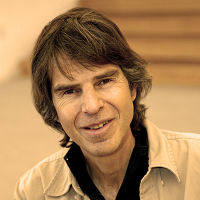
Santa Fe Institute
David Wolpert is a Professor at the Santa Fe Institute. He is an IEEE fellow, is the author of three books and more than 200 papers, has three patents, is an associate editor at more than half a dozen journals, and has received numerous awards. He has more than 17,000 citations in a wide range of fields, including physics, machine learning, game theory, information theory, the therodynamics of computation, and distributed optimization. In particular, his machine learning technique of stacking was instrumental in both winning entries for the Netflix competiton, and his papers on the no free lunch theorems jointly have more than 7,000 citations.
He is a world expert on using nonequilibrium statistical physics to analyze the thermodynamics of computing systems; extending game theory to model humans operating in complex engineered systems; exploiting machine learning to improve optimization; and Monte Carlo methods.
Previously he was the Ulam Scholar at the Center for Nonlinear Studies at Los Alamos National Laboratory, and before that he was at the NASA Ames Research Center and was a consulting professor at Stanford University, where he formed the Collective Intelligence Group. He has worked at IBM and at a data mining startup, and he is external faculty at numerous international institutions. His degrees in physics are from Princeton University and the University of California.

